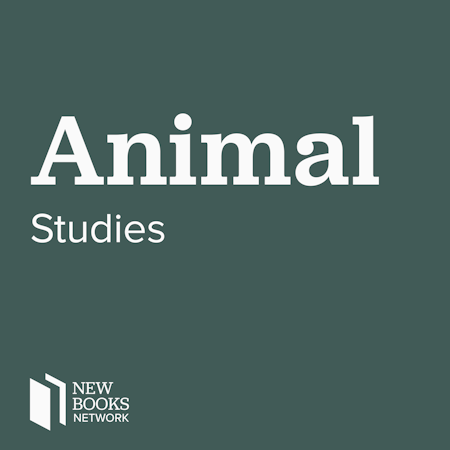
New Books in Animal Studies
Interviews with scholars and activists on animals and animal-human relations.
276
Gregory Forth, "A Dog Pissing at the Edge of a ...
Based on extensive field research, the book explores the meaning and use of over 500 animal metaphors employed by the Nage...
55 min
277
Ernest Freeberg, "A Traitor to His Species: Hen...
In Gilded Age America, people and animals lived cheek-by-jowl in environments that were dirty and dangerous to man and animal alike...
59 min
278
Morality in Nature: What Honeybees and Flowers ...
An interview with Christopher Ketcham
15 min
279
Frans de Waal, "Mama's Last Hug: Animal Emotion...
de Waal offers a fascinating exploration of the rich emotional lives of animals,,.
56 min
280
Carl Safina, "Becoming Wild: How Animal Culture...
Some people insist that culture is strictly a human accomplishment. What are those people afraid of?
62 min
281
Jessica Pierce, "Run, Spot, Run: The Ethics of ...
A life shared with pets brings many emotions....
70 min
282
Rachel Mundy, "Animal Musicalities: Birds, Beas...
What makes song sparrows, Verdi, medieval monks, and minstrelsy part of the same taxonomy?
81 min
283
Justice to Man’s Best Friend: The Ethics of Com...
An interview with Candace C. Croney
18 min
284
Peter Carruthers, "Human and Animal Minds: The ...
Do nonhuman animals have phenomenally conscious mental states?
60 min
285
Timothy Barnard, "Imperial Creatures: Humans an...
Barnard explores the more-than-human entanglements between empires and the creatures they govern...
42 min
286
Joshua Specht, "Red Meat Republic: A Hoof-to-Ta...
Why do Americans eat so much beef?
28 min
287
Mark Alizart, "Dogs" (Polity, 2019)
Alizart offers us a surprising new portrait of the dog as thinker―a thinker who may perhaps know the true secret of our humanity...
44 min
288
Karine Gagné, "Caring for Glaciers: Land, Anima...
Gagné explores how relations of reciprocity between land, humans, animals, and glaciers foster an ethics of care in the Himalayan communities of Ladakh...
97 min
289
Geoffrey Barstow, "Food of Sinful Demons: Meat,...
Barstow explores the tension between Buddhist ethics and Tibetan cultural norms to offer a novel perspective on the spiritual and social dimensions of meat eating...
62 min
290
T. J. Kasperbauer, "Subhuman: The Moral Psychol...
Why do we put other animals in the various categories we do, and treat them in the various good and bad ways that we do?
60 min
291
Radhika Govindrajan, "Animal Intimacies: Inters...
Animal Intimacies is a path paving work that combines theoretical innovation and playfulness, ethnographic depth, and profound attunement to capturing the aspirations and tragedies of everyday life through the art of narrative...
52 min
292
Peter Sahlins, “1668: The Year of the Animal in...
Peter Sahlins’s 1668: The Year of the Animal in France (Zone Books, 2017) is a captivating look at the role of animals in court and salon culture in the first decades of Louis XIV’s reign in France. Focusing on the years in and around 1668,
51 min
293
Frederick L. Brown, “The City is More Than Huma...
Not all city dwellers are bipedal, according to Frederick L. Brown, author of The City is More Than Human: An Animal History of Seattle (University of Washington Press, 2016). The history of Seattle, and all cities,
37 min
294
Monica Mattfeld, “Becoming Centaur: Eighteenth-...
Monica Mattfeld’s Becoming Centaur: Eighteenth-Century Masculinity and English Horsemanship (Penn State University Press, 2017) explores the complex relationship between men and their horses, and reflects upon how these interactions defined a man’s gen...
30 min
295
Kathleen McAuliffe, “This is Your Brain on Para...
Kathleen McAuliffe‘s This is Your Brain on Parasites: How Tiny Creatures Manipulate Our Behavior and Shape Society (Mariner Books, 2017) unveils the world of parasites. From the influence of parasites on the ability to transform rats brains to be easil...
38 min
296
John Hadley, “Animal Property Rights: A Theory ...
John Hadley’s Animal Property Rights: A Theory of Habitat Rights for Wild Animals (Lexington Books, 2015) presents a novel approach to addressing habitat and biodiversity loss: extending liberal property rights to wildlife.
54 min
297
Marta Zaraska, “Meathooked: The History and Sci...
Here in the U.S. we’ve just celebrated the Fourth of July, with its parades, fireworks, and, of course, cook-outs. If you’re like me, the smell of a grilling burger can make you salivate from across the yard.
41 min
298
David Grazian, “American Zoo: A Sociological Sa...
Urban zoos are both popular and imperiled. They are sites of contestation, but what are those contests about? In his new book, American Zoo: A Sociological Safari(Princeton, 2015), ethnographer David Grazian tracks the competing missions of zoos as sit...
40 min
299
Anita Guerrini, “The Courtiers’ Anatomists: Ani...
Anita Guerrini‘s wonderful new book explores Paris as a site of anatomy, dissection, and science during the reign of Louis XIV between 1643-1715. The journey begins with readers accompanying a dead body to sites of dissection across the city,
64 min
300
Federico Marcon, “The Knowledge of Nature and t...
Federico Marcon‘s new book opens a fascinating window into the history of Japan’s relationship to its natural environment. The Knowledge of Nature and the Nature of Knowledge in Early Modern Japan (University of Chicago Press,
73 min